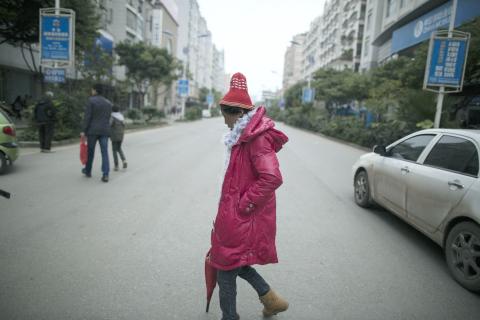Bathed in the fluorescent pink light that signaled that she was ready for business, Li Zhengguo rattled off the occupational hazards of working as a prostitute in China: abusive clients, the specter of HIV and the scathing glares of neighbors that tear at her soul.
“My life is so full of anxieties,” she said between customers one recent evening. “Sometimes my heart feels rotten for having given away my body.”
But her greatest fear is a visit from the police. The last time she was hauled into the local station house, Li was dispatched without trial or legal representation to a detention center in neighboring Hebei province, where she spent six months making ornamental paper flowers and reciting the list of regulations that criminalize prostitution.

Photo: AFP
Her incarceration at the Handan Custody and Education Center ended with a final indignity: She had to reimburse the jail for her stay, about US$60 (NT$1,800) a month.
“The next time the police come to take me away, I’ll slit my wrists,” said Li, 39, a single mother with two sons.
Advocates for legal reform claimed victory in November after the Chinese government announced that it would abolish “re-education through labor,” the system that allows the police to send petty criminals and people who complain too loudly about government malfeasance to work camps for up to four years without trial.

Photo: AFP
But two parallel mechanisms of extralegal punishment persist: one for drug offenders, and another for prostitutes and their clients.
“The abuses and torture are continuing, just in a different way,” said Corinna-Barbara Francis, a China researcher at Amnesty International.
The murky penal system for prostitutes, “custody and education,” is strikingly similar to re-education through labor. Centers run by the Ministry of Public Security hold women for up to two years and often require them to toil in workshops seven days a week for no pay, producing toys, disposable chopsticks and dog diapers, some of which the women say are packaged for export.
Male clients are also jailed at such centers, but in far smaller numbers, according to a report released in December by the advocacy group Asia Catalyst.
Women who have passed through some of the nation’s 200 custody and education prisons describe onerous fees and violence at the hands of guards.
As with re-education through labor, the police mete out custody and education sentences without trial and with little chance for appeal.
“It’s arbitrary, abusive and disastrous in terms of public health,” said Nicholas Bequelin, a senior researcher at Human Rights Watch, which issued a report last year on the perils faced by women working in China’s booming sex trade. “It’s another rotten branch of the Chinese legal system, and it should be abolished.”
The Asia Catalyst report portrays custody and education as a vast moneymaking enterprise masquerading as a system for rehabilitating wayward women. Established by China’s legislature in 1991, the detention centers are run by local public security bureaus, which have the final say on penalties. Former inmates say police officials sometimes solicit bribes to release detainees.
The government does not publish regular statistics on the program, but experts estimate that 18,000 to 28,000 women are sent to detention centers each year. Inmates are required to pay for food, medical exams, bedding and other essential items like soap and sanitary napkins, with most women spending about US$400 for a six-month stay, the report said.
“Those who couldn’t pay were only given steamed buns to eat,” one woman told Asia Catalyst.
At some centers, visitors are required to pay an entry fee of US$33 to see imprisoned relatives.
Those who have studied the system say that local public security bureaus earn a sizable income from what is essentially free labor.
The Chinese government’s approach to prostitution is inconsistent. After the Communist victory in 1949, Mao Zedong made the rehabilitation of prostitutes, whom the Communists saw as victims of capitalist exploitation, a priority. During his first years in power, he effectively eradicated the trade.But the introduction of market reforms in the early 1980s led to a resurgence in prostitution, and up to 6 million women were estimated to be working in the sex industry in recent years, according to a United Nations report.
Today, Chinese cities are full of “hair salons” with curtained-off back rooms and no visible scissors; at upscale karaoke parlors, young female attendants double as call girls. The police are often paid to look the other way, many prostitutes say.
But that apparent forbearance evaporates during periodic “strike hard” campaigns in which large numbers of prostitutes are rounded up, often before important political meetings. A police official in Liaoning province told Asia Catalyst that cities and counties were required to meet quotas, prompting occasional “vice sweeps” to replenish jailhouse workshops.
Legal advocates say the police sometimes use violence to extract confessions and force women to strip for photographs that become evidence of their transgressions.
“The way they are treated is such a violation of their dignity,” said Shen Tingting, advocacy director at Asia Catalyst. “The entire system stigmatizes women and sends out a message that sex workers are dirty and need to be reformed.”
Women describe the camp labor as tolerable but tedious. In an interview, a 41-year-old native of southeast Jiangxi province said she spent her days at one such jail making stuffed animals, sometimes until 11pm.
“You’d sew so much, your hand would hurt,” said the woman, who would give only her street name, Xiao Lan, or Little Orchid.
She laughed when asked about the program’s education component — mostly long sessions spent memorizing the rules governing behavior at the jail.
“We called the guards teachers and they called us students, but we didn’t learn anything,” she said.
Xiao Lan was released after six months, and she immediately returned to her old trade.
“So, too, did all the other girls,” she said.
Reached by phone, public security officials in several provinces that operate large custody and education centers declined to discuss the matter, saying that they were not authorized to speak to the news media.
Those seeking to abolish the system acknowledge a tough road ahead. There is little public support for reducing the penalties for prostitution, and China’s influential domestic security apparatus is unlikely to give up willingly the power and profits of the current system.
The indignities of incarceration do little to dissuade women who can earn more than US$1,000 a month as prostitutes, triple the average income for unskilled laborers in China.
Li, the single mother of two, said she was illiterate and could never make as much money in a conventional job. “I’m an uneducated country girl with no skills,” she said.
A former pig farmer with a giddy laugh, Li operates out of a cramped storefront in the commercial heart of Beijing. A flimsy wall separates her work space from the bedroom that she shares with her sons.
She relies on a steady clientele, mostly married men and lonely migrant workers, but even the regulars sometimes try to leave without paying. Then there are those who claim to be police officers and demand free sex, customers who furtively cut off the tops of condoms, and drunken men who fly into violent rages when Li refuses to do their bidding.
“I’d call the police, but they always take the customer’s side,” she said.
With that, she excused herself to welcome a client who was waiting outside her door.

Jan. 26 to Feb. 1 Nearly 90 years after it was last recorded, the Basay language was taught in a classroom for the first time in September last year. Over the following three months, students learned its sounds along with the customs and folktales of the Ketagalan people, who once spoke it across northern Taiwan. Although each Ketagalan settlement had its own language, Basay functioned as a common trade language. By the late 19th century, it had largely fallen out of daily use as speakers shifted to Hoklo (commonly known as Taiwanese), surviving only in fragments remembered by the elderly. In

William Liu (劉家君) moved to Kaohsiung from Nantou to live with his boyfriend Reg Hong (洪嘉佑). “In Nantou, people do not support gay rights at all and never even talk about it. Living here made me optimistic and made me realize how much I can express myself,” Liu tells the Taipei Times. Hong and his friend Cony Hsieh (謝昀希) are both active in several LGBT groups and organizations in Kaohsiung. They were among the people behind the city’s 16th Pride event in November last year, which gathered over 35,000 people. Along with others, they clearly see Kaohsiung as the nexus of LGBT rights.

Dissident artist Ai Weiwei’s (艾未未) famous return to the People’s Republic of China (PRC) has been overshadowed by the astonishing news of the latest arrests of senior military figures for “corruption,” but it is an interesting piece of news in its own right, though more for what Ai does not understand than for what he does. Ai simply lacks the reflective understanding that the loneliness and isolation he imagines are “European” are simply the joys of life as an expat. That goes both ways: “I love Taiwan!” say many still wet-behind-the-ears expats here, not realizing what they love is being an

In the American west, “it is said, water flows upwards towards money,” wrote Marc Reisner in one of the most compelling books on public policy ever written, Cadillac Desert. As Americans failed to overcome the West’s water scarcity with hard work and private capital, the Federal government came to the rescue. As Reisner describes: “the American West quietly became the first and most durable example of the modern welfare state.” In Taiwan, the money toward which water flows upwards is the high tech industry, particularly the chip powerhouse Taiwan Semiconductor Manufacturing Co (TSMC, 台積電). Typically articles on TSMC’s water demand